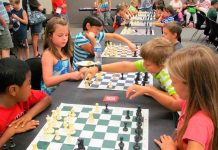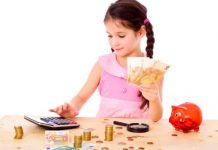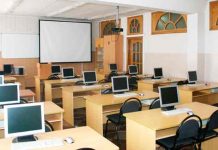Открытый урок по английскому языку в 3 классе по теме «Здоровая школа» (учебник Биболетова М.З.)
Цель: применить полученные знания и умения на практике с последующим
выходом на монологическое высказывание по теме.
Образовательные задачи:
— учить учащихся пользоваться изученным лексическим и грамматическим
материалом
— обсуждать проблемы по теме в диалогической и монологической речи
Воспитательные задачи:
— прививать чувство любви к своей школе
— воспитывать коммуникативную иноязычную культуру
Развивающие задачи:
— развивать навыки аудирования, письма, чтения и говорения
— учить самостоятельно решать проблемы на основе изученного материала
Формы:
— коллективная
— групповая
— парная
Методы:
— эвристический
— частично-поисковый
Оснащение: доска, картинки, магнитофон, индивидуальные карточки для рисования, карточки для оценивания, цветные карандаши, цветные мелки, колпак повара, следы.
Ход урока
I. T — Good morning, my dear friends!
P-s – Good morning, good morning, good morning to you,
Good morning dear teacher, we are glad to see you!
T – I am glad to see you, too. Sit down, please. How are you all today? We are going to have an unusual lesson today. Look at the blackboard and guess the name of our lesson. There are some pictures of the products you know. Write down the names of these products in the lineword: (уч–ся пишут слова на доске)
|
|
|
|
|
| |
|
| h | a | m |
|
|
| b r | e | a | d |
|
|
| j | a | m |
|
|
|
| m i | l | k |
|
|
|
|
| t | e | a |
|
|
| c | h | e | e | s | e |
| h o n e | y |
|
|
|
|
|
|
|
|
|
|
|
|
|
|
|
|
|
|
| s | w | e | e | t | s | |
|
| c | o | f | f | e | e |
| c | h | i | c | k | e | n |
| p | o | t | a | t | o |
|
| s | o | u | p |
|
|
|
|
| l | e | m | o | n |
|
|
|
|
|
|
|
|
|
So the name of our lesson: P-s (read) – HEALTHY SCHOOL (название урока выносится на доску в качестве заголовка)
-
T – Who usually goes to school?
P-s – Students
T – You are quite right. And students are real people with the parts of the body. Let`s remember these words.
1. Один из учеников показывает картинки с изображениями частей тела, а остальные называют их.
2. «Следы» — раскладывают на полу, представьте, что перед вами болото и чтобы через него перейти, вы должны хорошо знать слова ( один уч-ся выходит на следы, а другие ребята спрашивают его с англ. на русск. и наоборот)
3. Let`s play a game “Show me”
T – Show me your nose, eyes, teeth и т.д. (дети показывают)
4. T – translate from R into E
* голубые глаза * умные глаза
* большие руки * круглое лицо
* маленький нос * розовые щёки
* длинные ноги * короткие волосы
* красивые волосы * большая голова
T – And now let`s draw a funny person. Учитель диктует словосочетания, а уч-ся рисуют каждый на своём листе.
1. a short neck
2. a big head
3. small arms and hands
4. long legs
5. big blue eyes
6. a small nose
7. a big red mouth
8. white teeth
9. rosy cheeks
10. red long hair
T — exchange your sheets and check them (взаимопроверка по рисунку на доске, выставление оценок)
T – Let`s have a short rest and sing a song:
Clap, clap, clap your hands,
Clap your hands together.
Stamp, stamp, stamp your feet,
Stamp your feet together.
Touch, touch, touch your ears,
Touch your ears together.
Touch, touch, touch your cheeks,
Touch your cheeks together.
Shake, shake, shake your hands,
Shake your hands together.
Smile, smile at your friends,
Let us smile together.
-
T – All students work hard at the lessons. They read, write, recite poems and of course they ………… на доске шифр 3, 15, 21, 14, 20 Using the ABC guess what else students do at the lesson.
P – s — COUNT
T – So let`s count P1 – 1-10, P2 – 11 – 19, P3 – 20, 30, 40, 50 ……, P4 – counts boys, P5 – counts girls, P6 – counts all people in the classroom.
-
T- After hard work at the lesson students become hungry and want to eat something. And what can they eat? (Учитель показывает картинки с названиями продуктов, дети называют слова) Let`s play a game “Duel” from R into E, from E into R (учитель спрашивает слова по цепочке, кто не называет на счёт три, его “убивают» one, two, three you are killed) well, you know many words let`s check:
T – Guess the riddles
* It is a yellow fruit. It is sour, not big. You put it in your tea (lemon)
* It is a sweet, tasty thing. All children like it very much (ice cream, sweet, jam, honey)
* It is a vegetable. It is orange, big. People cook it on Halloween (pumpkin)
* It is a liquid. Usually small children like it. It is white. Cows give it to people (milk)
* It can be white or brown. You eat it with nearly every dish (bread)
* It is a liquid. It can be orange, apple, pear and others. You drink it (juice)
Okay, well done.
-
T – But sometimes students are late for breakfast. They go to the canteen and ask something to eat. Let`s make up dialogues between a cook (надеть на голову чепчик повара) and a student.
— Hello!
— Hello!
— May I have some soup?
— Of course. Here you are.
— Thank you.
— Would you like some potato with ham?
— Yes, please. And may I have some apple juice?
— Here you are. Help yourself!
— Thank you.
— You are welcome.
-
T – So what must we do to be healthy? (уч-ся делятся на 3 группы и вытягивают карточки, готовятся 2-3 мин., выходят к доске по группам и отвечают)
1 группа – рассказывает про здоровую и нездоровую еду
2 группа – рассказывает про личную гигиену
3 группа – рассказывает про занятия спортом
1 группа – We must eat porridge, cheese, carrot, cabbage, apples every day.
We must drink milk, juice every day.
We must not eat many sweets, chips.
2 группа – We must clean teeth, wash our face and hands.
We must not be lazy.
3 группа – We must run in the morning, jump, swim, skate, ski.
We must not be lazy.
T — Well, you are absolutely right. Let`s follow all these advice and we`ll be healthy.
VII. T – Did you like our lesson? Why did you like it?
— What mark did you deserve? (в начале урока уч-ся получили символы из учебника для самооценки, а сейчас они выбирают символ, который характеризует их работу и крепят его к импровизированной поляне – Well done, Very good, Good, Not bad)
VIII. T – Your home task is to sum everything we should do to be healthy (a story)
Thank you for you work, you really did your best. I liked it very much. Good — bye.





